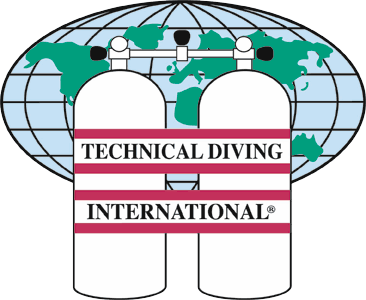Setting the Stage for Responsible Diving
Scuba diving, often described as a journey into the unknown, allows us to delve into the breathtaking beauty of the underwater world. The vibrant coral reefs and mysterious cenotes beckon us with their secrets. However, as adventurers of the deep, we are responsible for ensuring that our exploration does not come at the cost of the marine ecosystems we admire and promote responsible diving.
Deep Dark Diving isn’t just another diving company; we are fervent reef and cenote conservation advocates. Our mission extends beyond delivering unforgettable diving experiences; we aim to champion sustainable and eco-friendly diving practices. Join us as we embark on a journey into eco-conscious scuba diving in the heart of the ocean and within the enchanting cenotes.
Understanding Ecosystem Importance
The mesmerizing underwater world is a delicate balance of interconnected ecosystems. Coral reefs and cenotes are two integral components of this ecosystem, and understanding their importance is paramount.
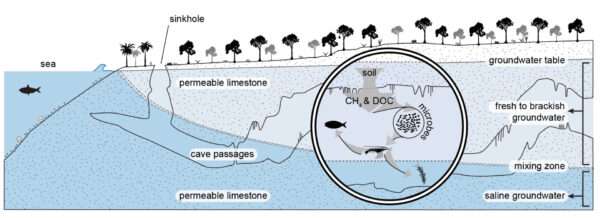
Coral reefs
Coral reefs, often referred to as “the rainforests of the sea,” are teeming with biodiversity. These underwater gardens provide a habitat for countless marine species, from tiny seahorses to massive sharks. Their significance goes beyond their natural beauty; they play a critical role in oxygen production and shoreline protection.
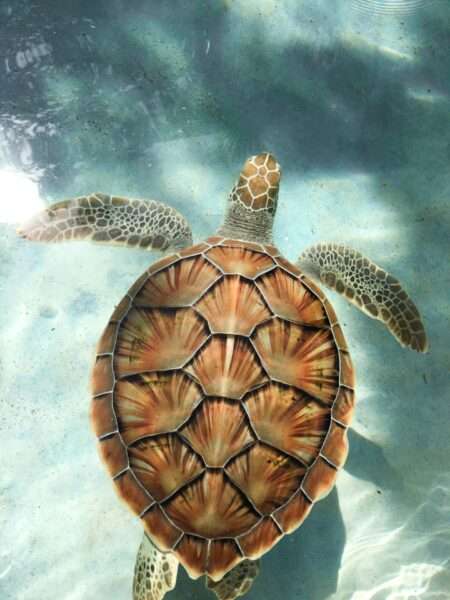
Diving in the Cenotes
Cenotes, on the other hand, are unique geological formations. These ancient underwater sinkholes, dotted throughout the Yucatan Peninsula, offer refuge to various lives. With their crystal-clear waters and hidden caves, cenotes are natural wonders waiting to be explored.
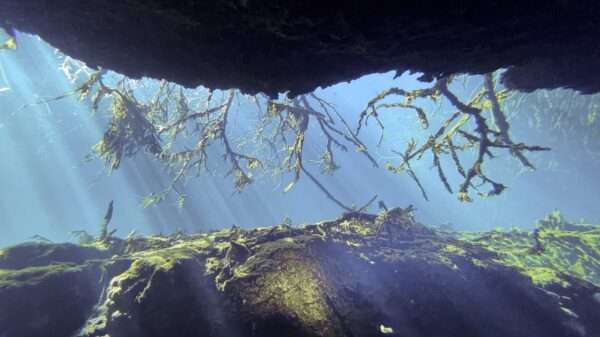
Yet, both these ecosystems are under threat from human activities. Pollution, overfishing, extensive urban growth, tourism, and the ominous shadow of climate change loom over these fragile environments. Our commitment to eco-friendly diving practices begins with acknowledging these issues and understanding the urgency of our role in their conservation.
Use Eco-Friendly Dive Gear for responsible diving
Sustainable Dive Equipment Choices
Embracing eco-friendly scuba gear is a fundamental step in minimizing our environmental impact. From biodegradable wetsuits to eco-conscious fins and masks, sustainable options are now available that ensure your underwater adventures leave no trace.
Choosing gear made from recycled or sustainable materials reduces your carbon footprint and supports companies committed to eco-conscious production. The careful selection of gear that prioritizes sustainability is a small yet significant way to make a difference in the dive community.
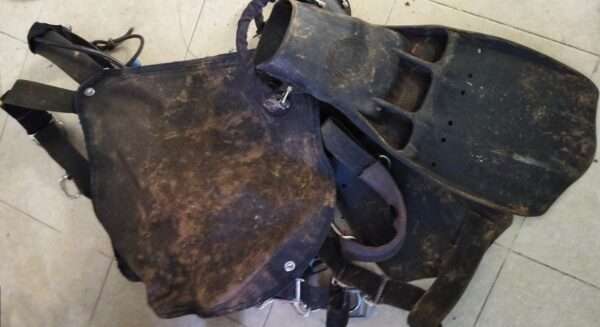
Maintenance and Proper Care
Sustainable gear choices are just the beginning. Proper maintenance is essential to extend the life of your equipment. Regular cleaning and servicing save you money in the long run and prevent discarded gear from clogging up landfills.
Caring for your gear ensures it serves you well for years and minimizes the waste associated with disposable equipment.
By choosing eco-friendly gear and maintaining it with care, you become an advocate for responsible diving practices both above and below the water’s surface. These simple steps contribute to a cleaner and healthier underwater world for everyone to enjoy.
Responsible Diving: Good Planning practices
Responsible diving begins with conscientious dive planning. Whether you’re exploring vibrant coral reefs or descending into the mystic cenotes, every dive site deserves thoughtful consideration.
Dive Site Selection
Choosing dive operators and destinations prioritizing eco-friendly diving practices is a key step in responsible dive planning. Seek out dive operators committed to minimizing their environmental impact, including adhering to local regulations and protecting sensitive marine and cave areas. Opt for operators prioritizing low-impact dive practices, such as mooring buoys instead of anchor drops, to prevent reef damage and select the right dive site to match your skills.
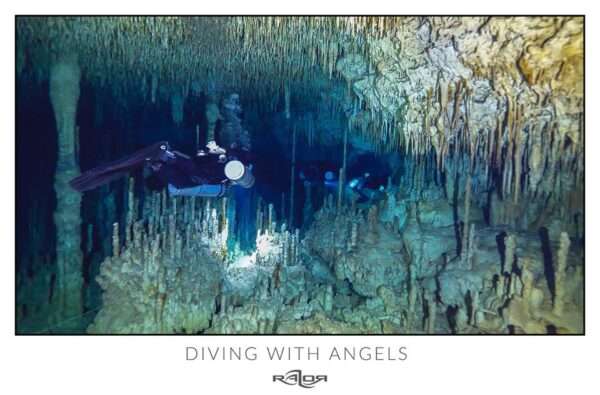
Keep your skills sharp – Keep Training
Dive site selection is not just about the destination; it’s about aligning with dive operators who share your values and commitment to preserving the underwater environment.
Dive Timing and Frequency
Mindful dive scheduling is another essential aspect of responsible dive planning. Avoiding crowded dive times enhances your experience and minimizes the stress on marine ecosystems.
By scheduling your dives during off-peak times, you contribute to a quieter underwater environment where marine life can thrive without disruption. Spacing out your dives also allows the ecosystem to recover and reduces the cumulative impact of multiple dive excursions on the same site.
Waste Management
Dive sites can become littered with debris and trash, posing a threat to the environment and the safety of divers. Responsible divers can take steps to address this issue through better waste management practices.
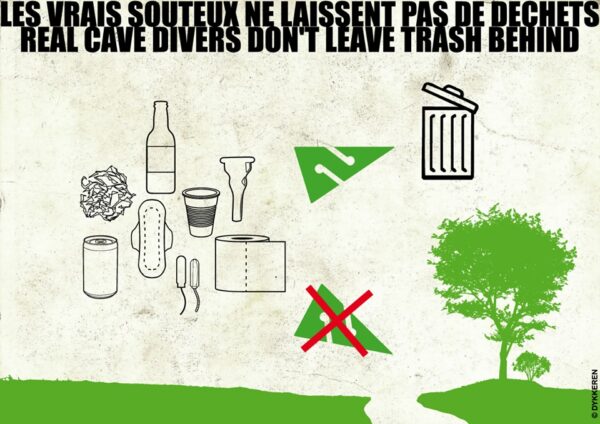
Plastic-Free Dive Essentials
Investing in reusable and eco-friendly dive accessories is a simple yet effective way to reduce plastic waste in our oceans. From stainless steel water bottles to mesh bags for collecting trash, eco-conscious gear choices can make a significant difference.
Choosing products that eliminate single-use plastics from your dive experience contributes to cleaner oceans and Cenotes and sets an example for other divers and dive operators. By eliminating unnecessary plastic waste, we can protect marine and Cenote life from the hazards of ingestion and entanglement, contamination, and alteration of the water quality.
Dealing with Trash Underwater
During dives, you have a unique opportunity to contribute to marine conservation. Bring mesh bags or collection nets to pick up trash and debris you encounter on the ocean floor or within cenotes.
Participating in underwater clean-up initiatives is an admirable way to give back to the marine environment that offers you so much beauty and wonder. These efforts ensure that the underwater world remains pristine for future generations of divers.
By adopting these waste management practices, you can help safeguard the marine environment from the growing litter threat.
The Best waste is no waste
Eco-Friendly Dive Agencies for Responsible Diving
Dive agencies play a pivotal role in shaping the practices and beliefs of the diving community. Choosing agencies that prioritize eco-friendly practices can have a far-reaching impact on the diving industry.
Green Initiatives by Dive Organizations
Many dive organizations recognize the importance of eco-friendly practices and take significant steps to reduce their environmental impact. These initiatives can range from encouraging their affiliated dive operators to adhere to strict environmental standards to conducting research and conservation projects.
Dive organizations that invest in eco-conscious practices contribute to preserving marine ecosystems and set a high standard for responsible diving.
Sustainable Certification Programs
Enrolling in diving certification programs emphasizing eco-consciousness is an ideal way to further your commitment to responsible diving. These programs offer valuable education and training that helps you understand the importance of protecting marine environments and the specific actions you can take as a diver.
Becoming certified in these programs enriches diving knowledge and showcases your dedication to eco-friendly practices. As an eco-certified diver, you inspire others to follow suit, creating positive change in the diving community.
By choosing dive agencies that promote eco-friendly practices and enrolling in sustainable certification programs, you support and reinforce the importance of responsible diving throughout the industry.
Marine and Cenote Life Awareness
Understanding the marine life that inhabits the underwater world is a fundamental step toward becoming a responsible and eco-conscious diver.
Educating Divers on Local Species
Deepening your connection to marine and cenote life begins with education. Familiarize yourself with the local species inhabiting the dive sites you explore. Learn about each species’ distinctive features, behaviors, and roles within the ecosystem.
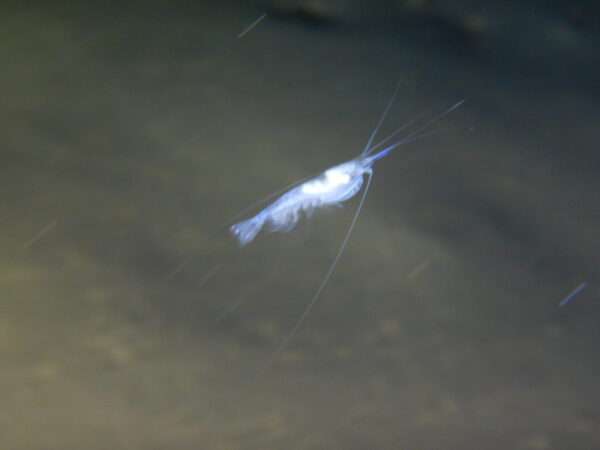
Understanding and respecting local species is key to minimizing disturbances during your dives. It also enriches your diving experience by allowing you to appreciate the intricate relationships within the marine environment.
Reef and Cenote Conservation Initiatives
Many dive operators and organizations actively support marine conservation projects. Getting involved in these initiatives is an excellent way to contribute to protecting and restoring reef and cenote ecosystems.
Participating in coral planting and restoration efforts gives back to the environment and provides a unique opportunity to engage with marine life directly. These experiences deepen your appreciation for the marine world and inspire a sense of responsibility for its protection.
By staying informed about local marine species and supporting conservation initiatives, you actively participate in preserving underwater environments.
Eco-Friendly Dive Certification
Becoming a certified diver is a significant milestone, and choosing eco-friendly certification programs is a responsible way to embark on your underwater journey.
Training for Sustainable Diving
Eco-friendly certification programs provide you with comprehensive training on how to dive responsibly. These programs cover everything from eco-conscious equipment choices to waste management and marine life interaction guidelines.
This training gives you the knowledge and skills to become a responsible and environmentally aware diver. You’ll learn to make informed choices above and below the water, reducing your impact on marine ecosystems.
Maintain neutral buoyancy to avoid ALL impact
Follow a Marine Ecosystem Program
Encouraging Responsible Diving
Inspiring fellow divers to pursue eco-friendly certifications is a powerful way to promote responsible diving. By sharing your knowledge and experiences, you encourage others to follow your path and take steps toward becoming environmentally conscious divers.
As the community of eco-certified divers grows, so does the collective commitment to responsible diving practices. This, in turn, fosters a deeper respect for the marine environment and contributes to its preservation.
Choosing eco-friendly certification programs and encouraging others to do the same will influence the diving community positively and create lasting change in dive culture.
Reducing Carbon Footprint
Scuba diving often involves travel, and the carbon footprint associated with travel is a concern for eco-conscious divers. Reducing your carbon footprint is an essential component of responsible diving.
Sustainable Travel Options
Choosing eco-friendly modes of travel to reach your dive destinations is a significant step in reducing your carbon footprint. Opt for low-impact transportation options like shared rides. Consider carbon offset programs to mitigate your emissions if air travel is necessary.
Sustainable travel choices reduce your environmental impact and support the growth of eco-conscious travel options. By aligning your travel choices with your eco-friendly values, you reduce the environmental impact of diving adventures.
Carbon Offsetting Programs
Carbon offsetting programs allow you to balance the carbon emissions associated with your travel. These programs invest in projects that capture or reduce an equivalent amount of greenhouse gas emissions to those generated during your journey.
Contributing to these programs is a responsible way to take accountability for the emissions produced during your travels. Participating in carbon offset programs supports efforts to combat climate change and minimize your environmental impact as a diver.
Reducing your carbon footprint is a pivotal aspect of responsible diving, ensuring that your underwater adventures align with your commitment to environmental conservation.
Best Practices for Cenote Diving
Diving in cenotes, the enchanting sinkholes of the Yucatan Peninsula come with unique challenges and opportunities to promote eco-friendly practices.

Minimizing Disturbance to Fragile Ecosystems
With their delicate formations and crystal-clear waters, cenotes require special care during dives. By following guidelines for cenote diving, you can minimize your impact on these unique ecosystems.
Avoid touching or damaging the cenote formations, as even small disturbances can have long-lasting effects. By respecting the natural beauty of cenotes, you ensure that these wonders remain unspoiled for future generations of divers.
Protecting Cenotes from Pollution
Cenotes are particularly vulnerable to pollution, given their open connections to the groundwater. Responsible cenote divers carry out all waste, including non-biodegradable items like plastic, to prevent pollution in these pristine environments.
Report any pollution incidents you observe to local authorities, as quick action can prevent irreversible damage to cenote ecosystems.
By adopting these best practices for cenote diving, you contribute to preserving these unique natural wonders.
Coral Restoration Efforts
Participating in coral restoration efforts is a tangible way to give back to the underwater environments that have brought you joy and awe.
Participating in Coral Planting
Coral reefs worldwide face unprecedented challenges, including coral bleaching and damage from storms and human activity. Joining coral planting and restoration projects is an impactful way to help rebuild and restore these vital ecosystems.
These hands-on experiences allow you to play an active role in rejuvenating coral reefs. Planting corals and monitoring their growth provides a lifeline to these threatened marine habitats.
Supporting Coral Conservation Projects
In addition to direct participation, you can support coral conservation projects financially and through volunteer work. Many organizations dedicate themselves to protecting and restoring coral reefs, and your contributions can make a substantial difference.
Coral conservation projects rely on dedicated individuals and organizations to fund their research and restoration efforts. Your support helps ensure that these projects continue to protect and restore our underwater coral communities.
By participating in coral restoration and supporting conservation projects, you take part in the vital work of preserving coral reefs and the countless species that rely on them.
Responsible Photography and Videography
Capturing the beauty of the underwater world is a passion for many divers. However, responsible underwater media practices are essential to ensure marine and Cenote life is not disturbed during photography or videography sessions.
Guidelines for Underwater Media
Learning how to capture the beauty of marine and cenote life without causing harm is crucial. Underwater photographers and videographers should adhere to guidelines prioritizing marine and cenote creatures’ welfare and their habitats.
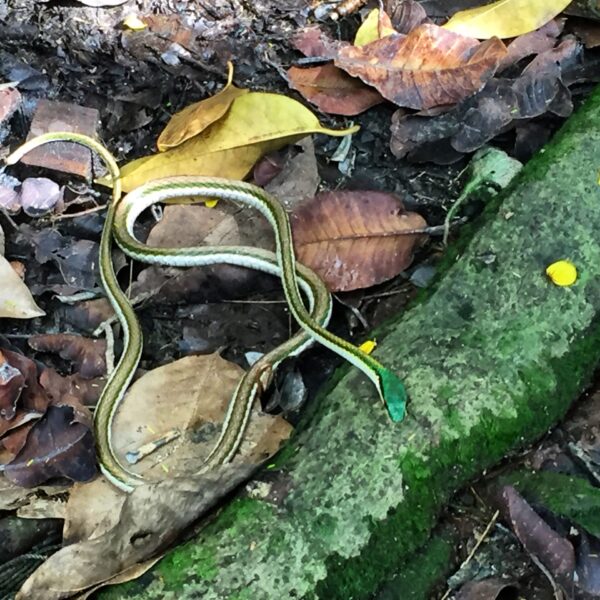
Respect the ‘Look but don’t touch‘ rule, which encourages a hands-off approach to marine and cenote life. Avoid disturbing or touching animals and manipulating the environment to get the perfect shot.
Promoting Ethical Wildlife Interaction
The images and videos you capture have the power to inspire respect for marine and cenote life and conservation. Share your work with an emphasis on ethical wildlife interaction and environmental responsibility.
You can raise awareness about the importance of responsible diving practices through your photography and videography. By promoting ethical wildlife interaction, you encourage others to engage with the marine and cenote environment in a manner that prioritizes the well-being of underwater creatures.
Leave No Trace Principles
The Leave No Trace (LNT) principles, well-known in outdoor and wilderness contexts, can also be applied to scuba diving.
Adhering to LNT Underwater
Applying Leave No Trace principles underwater means minimizing your impact on the marine and cenote environment. These principles include packing out all waste, avoiding contact with marine and cenote life and coral and bottom, and refraining from collecting souvenirs from the underwater world.
By adhering to these principles, you leave nothing but bubbles in the ocean, preserving dive sites’ natural beauty and ecological integrity.
Impact of Invasive Species
Understanding the dangers of invasive species is a critical aspect of Leave No Trace principles for divers. Invasive species can disrupt native ecosystems and harm local marine and Cenote life.
By following guidelines to prevent the spread of invasive species, you can help protect the delicate balance of the underwater environment.
Applying Leave No Trace principles above and below the water significantly contributes to responsible diving practices.
Eco-Friendly Dive Tour Operators
Choosing dive tour operators who prioritize eco-friendly practices is a substantial step toward responsible diving.
Choosing Environmentally Conscious Operators
Selecting dive operators with strong environmental values is crucial to responsible diving. Environmentally conscious operators are committed to minimizing their impact on the marine environment and often support marine conservation initiatives.
By aligning with operators that share your eco-friendly
Some of our eco-friendly practices at Deep Dark Diving
- Use of refillable water bottles
- Use of washable glasses
- Use of reusable ice packs
- Strict leave no waste in the Cenote – Even when a trash bin is present
- Collect all underwater trash – Even when no one is watching and outside cleanup days
- Use of biodegradable plant-based mosquito repellent
- NO use of sunscreen (use long sleeves, pants, hats… any reusable UV protector outfit is better than any so-called “biodegradable” sunscreen)
- Do not collect souvenirs
- Chose dive sites matching your skills and level of experience
- Avoid single-use plastic


